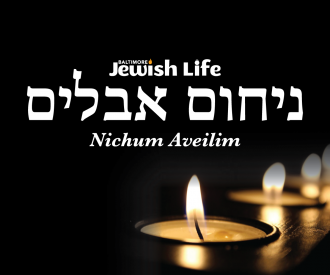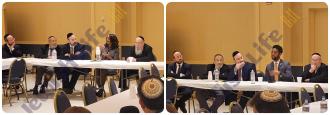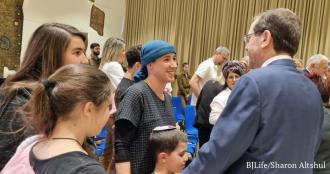Throughout the entire tense-filled episode, from the summoning of Binyonim down to Egypt; the discovery of the stolen goblet in his sack; and Yosef demanding Binyomin remain with him with the brothers returning empty-handed to their forlorn father, there is nary a peep from Binyomin.
Binyomin was no ‘child’; he was already a father of ten children and thirty two years old when this story takes place. Yet during the dramatic negotiation between Yehuda and Yosef where they discuss the fear and worry of their father, portraying the despair and grief he will experience if the ‘lad’ doesn’t return, not once is Binyomin offered a choice or opinion. Even during the discovery of the clandestinely placed goblet, Binyonim is unusually silent not offering even a smidgen of protest or defense on his own behalf.
Binyomin wasn’t an emotionless lemechel, who blithely floated through life mindlessly. He expressed his deepest emotions over the loss of his only ‘whole’ brother by thoughtfully naming each one of his ten children with names that memorialized Yosef’s greatness and character.
We are taught that Binyomin mastered the faculty of שתיקה, silence, as indicated in the fact that he was aware of the sale of Yosef and never revealed it to his mourning father.
The Midrash Tanchuma describes how when the brothers find the goblet in Binyonim’s sack they proceed to beat him between his shoulder blades declaring him a thief; he nevertheless remains quiet the entire time.
In fact we are informed that it was precisely in the merit of this sterling trait that the Shechinah, the Divine Presence, ‘rest between his shoulders’, dwelling in his territory specifically, as the Holy of Holies, the Entrance Hall and Inner Sanctuary, were situated solely on the territory of Binyamin.
What is so remarkable about the ability to remain silent that warrants such an amazing reward?
Even more perplexing is how is it possible that Binyomin was able to stifle the erupting emotions of frustration over so many years?
The Baal HaTurim points out that there is a phrase used only twice in all of Chumash, one of those appearing in our portion.
When making his heart rending appeal to Yosef to permit Binyomin to return to his father, Yehuda pulls on Yosef’s heartstrings by portraying Binyomin as,ויותר הוא לבדו לאמו ואביו אהבו, he alone is left to his mother, and his father loves him.(בראשית מד כ)
Elsewhere the Torah describes Yaakov’s isolation from his family when he goes back to fetch some pitchers and his sudden encounter and wrestling match with the Angel of Esav, ויותר יעקב לבדו ויאבק איש עמו עד עלות השחר, Yaakov was left alone and a man wrestled with him until the break of dawn.(שם לב כה)
The phrase ‘left alone’ used here, the Baal HaTurim teaches, relates to the commonality in both episodes to be prepared to fight. But by Binyomin the verse is describing Binyomin, not Yehuda who was the one prepared to fight Yosef. What element of battle is insinuated here, after all Binyomin seems to be the ultimate pacifist?
Rashi points out that the literal translation of this phrase is inaccurate since his mother was deceased, and should more appropriately be rendered, he alone is left from his mother, being the only remaining child from that mother, the wife of Yaakov, Rachel. The implication being that Yaakov cherished him as the only surviving child of his beloved wife Rachel that embodied his love for her as well.
But the Torah writes ‘to’ his mother, how are we to understand this ‘inexact’ word usage?
The Holy Munkatcher Rebbe, The Minchas Elazar, sees in this verse an allusion to the ultimate battle. He brilliantly interprets the verse as follows:
ויותר הוא לבדו, Binyomin finds himself alone...
The word הוא, for ‘him’, is comprised from the letters missing in the Torah’s description of G-d’s diminished presence in galus, exile. The verse describes how יד על כס י-ה , G-d’s hand is on the throne of G-d, swearing to do battle against evil.
The letter א is missing in the fuller depiction of His throne, כסא, as well as the two remaining letters of the Expressed Name, ו-ה, that are absent from the more complete description of His name, י-ה-ו-ה. The missing letters spell out הוא, Him, an indirect reference to G-d, intimating those times when G-d’s presence seems removed.
לאמו, to his mother...
Binyomin finds himself at times sensing isolation in the face of fear and frustration. He is indeed isolated ‘from his mother’, with ‘mother’ being used here euphemistically to the Shechinah, the Divine Presence as the verse in Yeshayahu describes, אמכם אשר שלחתיה, your mother that I sent away, a characterization of G-d dispatching the Divine Presence . (ישעיהו נ א)
ואביו אהבו, and his father loves him...
But Binyomin is reassured, that although he cannot at times sense His presence, his ‘Father’ is there and loves him, adoringly watching over him despite not being visible to Binyomin.
The circumstances of Binyomin’s life present a grueling challenge. His mother dies in childbirth. His beloved brother is ripped away from his doting father and betrayed by his brothers, being sold as a lowly slave to the decadent people of Egypt. Binyomin forges ahead in his desperate isolation, just as his father had when confronted by the marauding angel. He musters the quiet inner strength to connect and emulate his Father in Heaven, Who as well, dwells in isolation. ונשגב ד' לבדו, and the Lord alone shall be exalted.(שם ב יא)
The state of לבדו, ‘aloneness’, is not a state of helplessness. On the contrary it is the supernal ability to be independent on others for survival, and rather to connect so exquisitely with G-d despite the cloudiest of situations and sense the comfort and calm in His invisible presence; to not permit oneself to become dejected and reactive to the difficulties one faces, and instead remain silent and composed knowing He loves, protects and guides us at all times.
As the Torah states by Yaakov, this is our battle until the ‘break of dawn’, until the redemption will come.
Will we discover and develop our inner selves and reject the lure of external distractions and temptations that offer instant, but fleeting, diversion?
Binyomin is bestowed the appellation of ידיד ד', Beloved of Hashem.
One who lives with G-d ‘alone’ is worthy of hosting His presence.
May we merit to calmly sense that daily, and be worthy of His ידידות, ‘friendship’!
באהבה,
צבי יהודה טייכמאן

















